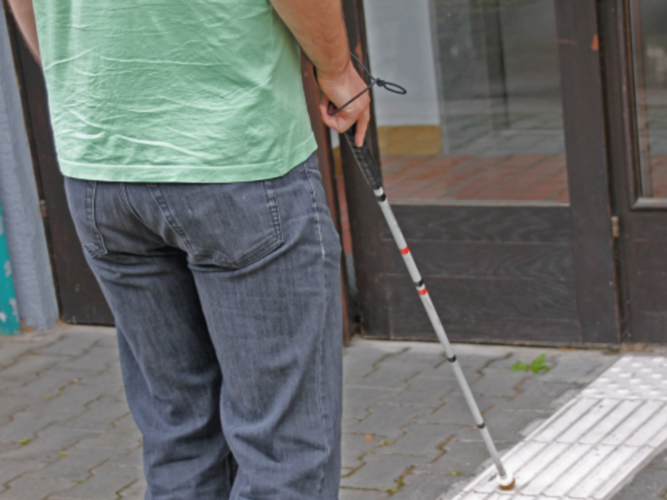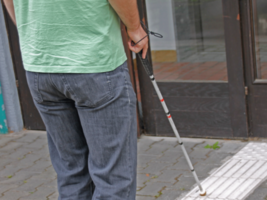The Ombudsman received a letter from a complainant who has been 100% blind since childhood. He has completed over 40 years of employment and is retired due to disability. When his hearing drastically deteriorated, he submitted a request to the Pension and Disability Insurance Institute of Slovenia for the recognition of disability allowance. The first-instance authority rejected his request, stating that during the proceedings it was found that the previously determined 100% physical impairment due to blindness in both eyes, which had entirely occurred before he was insured, had changed due to additional deafness from 13 August 2024 onwards. However, since this is not a deterioration of the existing physical impairment by at least 50%, the complainant is not entitled to disability allowance. In the appeal proceedings (also based on the inquiry and warnings from the Ombudsman) it was found that the complainant is entitled to disability allowance for a 60% physical impairment due to severe bilateral hearing loss in both ears.
* * *
The Human Rights Ombudsman of the Republic of Slovenia (Ombudsman) received a letter (complaint) from a complainant, describing problems in obtaining disability allowance. On 2 December 2024, within the statutory period, he appealed the decision of the Pension and Disability Insurance Institute of Slovenia (ZPIZ) to reject the recognition of entitlement to disability allowance, but received no decision about the appeal. The complainant could not understand why, despite having been recognised since 13 April 2022 as having a 100% physical impairment due to blindness in both eyes, due to a childhood illness, and bilateral hearing loss of 84.1% according to Fowler’s method, determined on 13 August 2024 due to illness, he is not entitled to the “physical impairment supplement” or disability allowance.
He also sent the Ombudsman the first-instance decision, which he challenged in his appeal, the expert opinion of the first-instance disability commission, and the referral of his file and the mentioned expert opinion for review to the second-instance disability commission. He asked the Ombudsman for assistance, as he has been waiting for a response regarding his appeal for some time.
The Ombudsman addressed an inquiry to ZPIZ to clarify of all the circumstances surrounding the decision-making on the complainant’s disability allowance. Both the first-instance decision and the expert opinion of the disability commission were poorly reasoned and also incomprehensible to the Ombudsman. Therefore, the Ombudsman emphasised in advance the importance of issuing administrative acts in accordance with the provisions of material regulations and the General Administrative Procedure Act (ZUP). This also follows from Paragraph 4 of Article 153 of the Constitution of the Republic of Slovenia, which stipulates that individual acts and actions of state bodies, self-governing bodies, and bearers of public authority must be founded on law or a legal regulation. While the explanation is not the most important part of the administrative decision (this being the pronouncement which becomes final, binding, and enforceable), its scope is defined in Article 214 of the ZUP; it ensures the conduct of a fair procedure, which derives from Article 6 of the European Convention for the Protection of Human Rights and Fundamental Freedoms (EKČP), the Ombudsman added in his letter to the ZPIZ.
The ZPIZ sent the Ombudsman the decision on the appeal dated 27 May 2025, with which the complainant’s appeal was partially granted and which recognised the complainant’s entitlement, from 13 August 2024 onwards, to disability allowance for the 60% physical impairment due to the consequences of illness. As of 1 March 2025, the disability allowance amounts to €58.58 per month. In the Ombudsman’s opinion, this decision is appropriately explained and comprehensible.
The Ombudsman informed the complainant that, in accordance with the guidelines for legal remedies, he has the right to file a complaint to the competent Labour and Social Court within 30 days if he does not agree with the received decision on the appeal. Only in this way can he achieve a review of the legality and correctness of the decision, or have the dispute between him and the ZPIZ regarding the right to disability allowance resolved by the court.
With regard to any additional rights which could the complainant also be entitled to due to his impairments and disability (since 15 September 1948 he has had a 100% physical impairment due to the loss of sight as a consequence of illness, and since 13 August 2024 he also has a 60% physical impairment due hearing loss as a consequence of illness), the Ombudsman advised the complainant to contact the competent bodies – namely the administrative unit responsible for deciding on rights according to the Equalisation of Opportunities for Persons with Disabilities Act (ZIMI), and the centre for social work, which decides on rights based on the Social Inclusion of Disabled Persons Act (ZSVI).
The Ombudsman recorded the complaint as justified. Thus, based on the complainant’s appeal and the Ombudsman’s inquiry, the ZPIZ issued a decision recognising the complainant’s right to disability allowance for a 60% physical impairment, which arose due to illness on 13 August 2024, effective from that date onwards. The Ombudsman assessed that this decision was also appropriately reasoned in accordance with the provisions of the ZUP. The Ombudsman considers this a success even though in the ZPIZ’s initial conduct, which contrary to the regulations refused the complainant’s request for the recognition of the right to the disability allowance with a first-instance decision, the Ombudsman recognised a violation of the rights of persons with disabilities under Article 52 of the Constitution of the RS; furthermore, the decision about the complainant’s appeal was not issued within the statutory four-month deadline. 9.2-6/2025

